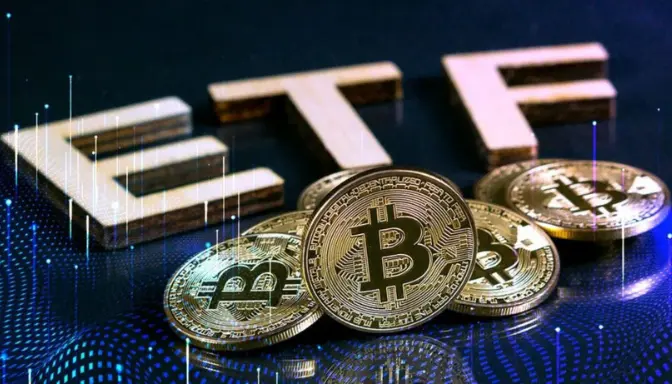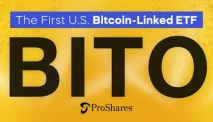Diksia.com - Bitcoin is the world’s most popular and valuable cryptocurrency, with a market capitalization of over $1 trillion as of December 2021. However, investing in bitcoin can be challenging for many investors, as it requires opening a cryptocurrency exchange account, storing the digital coins in a secure wallet, and dealing with price volatility and regulatory uncertainty.
That’s why many investors have been eagerly waiting for the launch of a bitcoin exchange-traded fund (ETF), which would allow them to gain exposure to the cryptocurrency through a more familiar and convenient vehicle. A bitcoin ETF would track the price of bitcoin and trade on a regulated stock exchange, just like any other ETF.
However, the U.S. Securities and Exchange Commission (SEC) has been reluctant to approve a bitcoin ETF, citing concerns over market manipulation, investor protection, and custody issues. As of December 2021, the SEC has rejected over a dozen proposals for a bitcoin ETF, and has delayed its decision on several others.
But in October 2021, the SEC finally gave the green light to the first bitcoin-linked ETF in the U.S., the ProShares Bitcoin Strategy ETF (BITO). BITO shares started trading on the NYSE Arca on October 19, 2021, and quickly became one of the most popular and liquid ETFs in the market, attracting over $1 billion in assets under management in its first week.
But what exactly are BITO shares, and how do they differ from other bitcoin ETFs? In this article, we will explain the main features, benefits, and risks of BITO shares, and help you decide whether they are a suitable investment option for you.
What are BITO shares?
BITO shares are the units of the ProShares Bitcoin Strategy ETF, which is an actively managed fund that aims to produce returns that correspond to the performance of bitcoin. However, unlike other bitcoin ETFs that seek to hold physical bitcoin or track the spot price of bitcoin, BITO shares invest in bitcoin futures contracts, which are agreements to buy or sell bitcoin at a predetermined price and date in the future.
BITO shares use the CME CF Bitcoin Reference Rate (BRR) as their benchmark, which is a daily reference rate that represents the U.S. dollar price of one bitcoin at 4 p.m. London time, based on data from several major bitcoin exchanges. BITO shares invest in the nearest month CME bitcoin futures contracts, and roll them over to the next month contracts before they expire, in order to maintain exposure to the BRR.
BITO shares are managed by ProShares, which is one of the largest providers of ETFs in the U.S., with over $60 billion in assets under management as of November 2021. ProShares is known for its innovative and specialized ETFs, such as leveraged, inverse, and thematic funds.
BITO shares have an expense ratio of 0.95%, which means that the fund charges $95 in annual fees for every $10,000 invested. BITO shares also pay monthly distributions, which are derived from the interest income generated by the fund’s cash and cash equivalents holdings. BITO shares have a yield of 14.98% as of November 2021.
What are the benefits of BITO shares?
BITO shares offer several benefits for investors who want to gain exposure to bitcoin, such as:
- Accessibility: BITO shares are available through any brokerage account that offers access to U.S. stock exchanges, without the need for a cryptocurrency exchange account or wallet. BITO shares can be bought and sold during normal trading hours, and can be easily integrated into a diversified portfolio of stocks, bonds, and other assets.
- Liquidity: BITO shares are highly liquid, as they trade on the NYSE Arca, which is one of the largest and most active stock exchanges in the world. BITO shares have an average daily trading volume of over 13 million shares, and a 30-day median bid-ask spread of 0.05%, which means that the difference between the buying and selling price of the shares is very small.
- Transparency: BITO shares are transparent, as they disclose their holdings, net asset value (NAV), and market price on a daily basis. BITO shares also use the BRR as their benchmark, which is a reliable and widely accepted reference rate for the price of bitcoin. BITO shares are regulated by the SEC, which imposes strict rules and standards for the fund’s operations, reporting, and compliance.
- Performance: BITO shares have closely tracked the performance of spot bitcoin, since inception. BITO shares have a correlation coefficient of 0.99 with bitcoin, which means that they move in the same direction and magnitude as bitcoin. BITO shares have returned 115.56% since their launch, compared to 113.86% for bitcoin.
What are the risks of BITO shares?
BITO shares also entail some risks for investors, such as:
- Volatility: BITO shares are volatile, as they reflect the price movements of bitcoin futures contracts, which are influenced by the supply and demand of bitcoin, as well as the expectations and sentiments of market participants. Bitcoin futures contracts can also trade at a premium or discount to the spot price of bitcoin, depending on the market conditions and the time to maturity of the contracts. BITO shares have a standard deviation of 67.82%, which measures the degree of variation of the returns around the average. BITO shares have also experienced significant drawdowns, or declines from the peak to the trough, of up to 37%.
- Costs: BITO shares incur costs, such as the expense ratio, the bid-ask spread, and the brokerage commissions, which reduce the returns of the fund. BITO shares also face the cost of rolling over the futures contracts, which can vary depending on the shape of the futures curve. If the futures curve is upward sloping, or in contango, the fund has to sell the expiring contracts at a lower price and buy the new contracts at a higher price, resulting in a negative roll yield. If the futures curve is downward sloping, or in backwardation, the fund can benefit from a positive roll yield, as it sells the expiring contracts at a higher price and buys the new contracts at a lower price. BITO shares have a tracking error of 1.70%, which measures the difference between the returns of the fund and the benchmark.
- Regulatory: BITO shares are subject to regulatory risks, as the rules and regulations governing the cryptocurrency and futures markets are evolving and uncertain. The SEC, the Commodity Futures Trading Commission (CFTC), and other authorities can impose new or change existing laws, policies, or guidelines that affect the operations, taxation, or trading of BITO shares, bitcoin futures contracts, or bitcoin itself. For instance, the SEC could approve a spot bitcoin ETF in the future, which could reduce the demand and liquidity of BITO shares, or cause them to trade at a discount to their NAV.
Conclusion
BITO shares are the first and largest bitcoin-linked ETF in the U.S., which offer investors a convenient and liquid way to gain exposure to the cryptocurrency through bitcoin futures contracts. BITO shares have several benefits, such as accessibility, transparency, and performance, but also entail some risks, such as volatility, costs, and regulatory uncertainty. BITO shares are suitable for investors who are bullish on the long-term prospects of bitcoin, and who are willing to accept the high level of risk and complexity involved in this innovative investment product.






